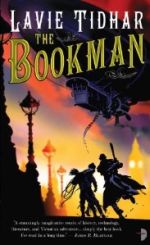Love and Anarchy and Science Fiction
(or Storia d’amore e d’anarchia e di fantascienza ovvero sta sera quando eravamo a letto e parlavamo dell’impero)
“Just tell me one thing, Salvatore, now that we’re bhai-bhai. Is it true what they say?”
The sake is freezing in our thimble-sized shots. I cringe, watching this conversation play out and willing Tenzin to shut up.
“What who says?” Salvatore shifts in his seat, getting ready.
“You know… the ‘Cannibal Count’. Eh?” Tenzin’s eyes glisten, wet and drunken. “Is it true? Did you really eat those – ”
“No, goddammit!”
* * *
They say he looks different now. That his eyes had been brilliant in his youth, and that the prison years had dulled them.
Of course, he has changed since prison. His hair is whiter. His jowls droop; he’s filled out. But I don’t see a big difference. And I’ve known him for years; I’ve known him longer than anyone else in the empire has.
I knew him when he first fell out of the Drop, half-dead and shivering. Before the sycophants, before the press interviews and Imperial court and the congress sessions. Before we fought the good fight, before his petty crimes and his epic treacheries.
I knew him when he was new to this universe. When he didn’t know a gas giant from a nebula. When he was still a Drop virgin, as we called them, reeking of that old Earth poverty.
Everyone thinks they know Salvatore Gennarino, especially these days. But I – I knew him then and I know him now.
* * *
Fringe worlds suck.
“Praise be to Avalokiteśvara, the Buddha of Compassion. Praise be to Chenrezig, the Buddha of Tibet.”
“Salvatore Gennarino.”
The Tibetan freedom fighter’s face is buried behind scarves, a hood and goggles. His trunk is thick with the layers of fur, polyester and wool, and his arms wave, puppet-like. I can’t believe Salvatore ever agreed to this, to meeting here, on this ice ball of a planet.
“We are honored by your presence,” the man – Tenzin – says.
Salvatore nods once, curt. “We like being here too. Shall we have some tea?”
I smile inwardly; anything to get inside, out of this cold.
The butter tea is salty and thick, sticking to my throat and lighting up my insides. It scalds my tongue, but I welcome the sour warmth. We sit on an ornate divan; I think I recognize a Renoir on the wall. A good signal, sensitively European, even if it was probably positioned there for our arrival.
I notice Salvatore take a sip of the tea and frown.
“Italy and Tibet have little common history, you know,” Tenzin is saying, “especially before the imperial period. Your famous traveler – Marco Polo, right? – never visited our mountain kingdom.”
Bells ring as the wind wails outside. I wonder if the Tibetan resistance has chosen this place because it reminds them of their ancestral homeland. Salvatore is nodding fiercely, staring into the fire. They say the brightness of his eyes was dulled in the prison. They couldn’t be more wrong.
“I hate the Chinese with my very bones,” Tenzin continues, “but I praise our common enemy for bringing us, at least, this one thing: that our great peoples may join together and be friends, and together bring down the twin empires!”
Salvatore’s eyes meet mine and he smiles crookedly.
“To friends!”
“To friends!”
We finish our teas to friendship.
Later, we examine the guns and talk about prices.
* * *
We spend our time shuttling between Salvatore’s gaudy congressional offices on Delhi Prime and fringe worlds out in wild space. The Drops eat away at our months, but we sacrifice that time to the cause.
Things in his office on Delhi Prime: oak desk, an extra sherwani suit and shoes, an emergency response button, my AK-47, a bust of His Magnificence, a rosary (his) and a pooja set (mine).
Things in our bedroom on the ship: old paperbacks about pre-Imperial history, a cookbook from my mother, narcotic soap (of which I disapprove), condoms, VitaliMan, anti-anxiety drops, anti-depressants, vitamins, a political magazine.
The Droplag makes me taste cheese in my dreams; for Salvatore, it makes him howl.
* * *
When I first met Salvatore, I had been working as a Hindustani Imperial guard at a Drop customs office.
Those were the early days of colonization, when crowds of huddled Earthers used to come through the Drop, and we would herd them to the various bored Immigration and Customs bureaucrats sitting behind their cages. We trafficked enormous amounts of people then; daily, we saw forged papers, dubious degrees. The worst efforts adorned the walls of the customs agents for later fun. I thought it was funny, too. I thought it was edgy. I thought I was sticking it to the Man – the “Man” being my parents.
Regional purity was still in vogue then, and so Telugus were sent to the various New Kakinadas, Bengalis to New Kolkata, Punjabis to New Kapurthala – distant moons and virgin planets, fertile lands for the empire to grow.
Non-Hindustani Earthers were relegated to the less successful terraforming projects – the too-cold planets, the too-hot ones, the ones with barren soils and distant suns and never enough water. If any Chinese was unlucky enough to stumble into our territory by some mid-Drop mix-up, we were ordered to shoot them on sight.
But that never happened, and it was only later that I learned that the ‘accidental Chinese Drop-in’ was a bogeyman and a practical impossibility. What can I say? It seems obvious now. We were ignorant.
Instead, the more immediate threats were the old resistance groups: the Black Hats, the American Liberation Front. Groups that would sooner bomb a Drop than let the empire spread. Because of them, any non-Hindustani immigrant was subject to immediate inspection post-arrival.
I remember the day Salvatore came. He came alone, off-hours. The Drop was technically closed, but suddenly I saw the blue light at of the Incoming chute brighten – I guess our entryway was still jacked into the Drop our space station was orbiting around, one last ship must have Dropped in, I don’t know – and then a man staggered through.
He was wearing gumboots and a crusty, rust-colored jacket. He came from Venice, he said, and I asked him to tell me more about the place.
* * *
Salvatore doesn’t talk much about the prison, but the ‘Cannibal Count’ thing gets him going. As soon as we get back to the ship, he’s in a lather. I’m punching in the Drop coordinates for Delhi Prime while he paces behind me.
“What in the hell does he think I am? Am I some sort of spectacle for them? Do they think with a little tea and a little sake, it’s suddenly all Tibet-Italia bhai-bhai? Do they think it’s just a bahut bahut acchi fillum for them to have fun with; a story with some accha drama and a little naach-gaana? You know what I should have told them? You know what I think they should do? Vaffanculo!”
I can’t tell if his head-wobbles and Hindustani interjections are an ironic caricature, or if he’s just absorbed our culture so much without realizing it. After a few years on the Prime, everyone begins to sound like they’re from Delhi.
He knows how to tell people off in every language; it was useful in prison, I imagine. He can tell you to screw your mother in the court language, various regional languages (Marathi being especially colorful), his native Italian, Mandarin, Cantonese, Tibetan, and, he claims, Swahili. I’ve learned how to recognize the Italian words.
“They’re obviously idiots,” I offer. “Forgive them their ignorance.”
“They should all die,” he spits.
Everyone dies, I think. Later, I find him sitting in the armchair, a book by Fat Sharma on political philosophy and non-violent resistance on his lap. He’s scribbling furiously in the margin.
I worry about Salvatore; he’s got so many people to be angry towards: the Hindustanis for occupying his homeland, for kicking him out into the stars, for imprisoning him when he fell into crime. The Chinese for not providing a real alternative to this hegemony, for offering essentially an oppression-for-oppression trade. The Tibetan freedom fighters down on that snow planet; for their jolly curiosity about the time he almost ate another human being. His parents, for being from the wrong part of Earth. Bad memories, and no options. The walls feel close.
I watch him with the book until he finally sees me. When he does, he stands and throws it, hard. The spine crashes into the wall. Loose papers drift impotently to the ground. The room smells a little boozy.
“So, are you coming to bed?”
I’m already peeling off my body armor. As Salvatore’s Head of Security, it feels like the more power he accumulates, the more stuff I have to wear.
I strip off the ammo packs, unlace the knee-high boots, dismantle the AK-47 and pull out my ponytail. Salvatore, instead, undoes his dhoti with a yank, lets it fall to the ground, and then walks around in kurta and underwear, whiskey-soda in hand.
“Do you know the story of Indira Gandhi?”
“I don’t think so.”
“Cazzo, it’s your own history and I know it!”
“Just tell me, Salvo, don’t be a mean drunk.”
“I’m not – okay, it’s ancient history. Maybe twentieth or twenty-first century… Her own bodyguards killed her.”
I would never do that, I want to say. What the hell are you implying? I want to ask. I get angry. I get sad. The bed sheets are cold.
“Right, I think I do remember her now. Wasn’t she right before Sonia Gandhi, the Italian-Hindustani Prime Minister?”
Salvatore shrugs and turns over in bed. I kiss his ear. I don’t want him to win so easily, brushing aside my support, turning me into a villain too. Just because I’m from the wrong part of Earth too, the ruling part; I still worry he thinks I’m a closet Occidentalist.
But I shouldn’t worry. He responds almost immediately and, as in all things, I can always count on his hunger. He is frantic in his pleasures, and I listen to the clock ticking on the nightstand.
* * *
We were the party of peaceful secession, then we were the party of bombs, and now we’re the party of legitimization.
We argue for pluralism in the Hindustani Imperial Congress; we’ve won a few seats and Salvatore campaigns on the scratchy, dusty worlds that dot the forgotten edges of the Drop network. But who wants to give disaffected billions any real rights? Who wants democratically-elected nut jobs? Extreme conditions breed extreme thinking, Salvatore says.
All that Drop travel gives us nightmares and terrible lag; we have trouble leading normal lives when travel eats the years up. But anything for the cause, for the party, and for Salvatore’s promised cabinet seat in the next election.
The Rights For All Party seeps into our dreams; we work to make it legitimate after twenty years of leaving bombs in diplomats’ cars, several failed experiments, and a tenuous Diwali Day Peace Agreement. Meanwhile, we keep in touch with the underground arms trade.
Tenzin tells us the Chinese plan to Drop into the system of New Peshawar and take out the colony there. Tenzin says he hates the Hindustanis almost as much as the Chinese; empires are empires. Instability will be our chance for true democracy, Tenzin says. It’ll be our chance to really punch a hole through that impenetrable Imperial court. I smirk. I frown.
I don’t know how I feel about any of this anymore.
Emperor Babar-Krishna the Magnificent tells Salvatore behind closed doors that he’s ready to let some of these old racial tensions go.
“It doesn’t mean much of anything anymore, does it? All this pedigree and caste nonsense,” His Imperial Highness admits, shaking his head. “Out here in the dark. What’s the point? As long as you’re not Chinese, you may as well be full Hindustani.”
It’s a significant political gain, it comes with enfranchisement and rights and recognition, and yet Salvatore seethes at being lumped together with his oppressors. Former oppressors, I remind him. In private, he fills me up with stories of the occupation at Venice. In private, I smell his hair and marvel at his inability to mellow with age.
“We’ve led violent lives,” I say, his head resting on my chest. I trace patterns on his back. “Let’s retire. Hey Ram.”
“Hang up our dueling pistols?” he smirks.
“Dueling pistols come in boxes, dear, not holsters.”
Salvatore is not a large man, and I wonder how he survived winters on the prison colony. His frame seems suitable for slipping between the cracks, for building tiny gadgets on factory floors, not for the tundra. But everything about him hardened in there – especially his sense of injustice.
He has a silvery scar trailing down his thigh, from hip to kneecap. One of his fingers is bent, the nail forever growing black and broken.
I knew him before and I knew him after. He doesn’t mention New Peshawar again.
* * *
When New Peshawar is nuked, the entire Drop network goes insane. Two celebrity clones, a Shah Rukh Khan and a Shalu, were performing on the colony when the bombs fell, and stories spill out about the pedigree of the colony’s governor, Balbir Singh. Everyone is very sympathetic and alarmed and indignant. There are rumors Governor Singh escaped before the mushroom clouds rose, but no one can find him – or the clones, for that matter.
It’s counted as a great loss to the entertainment industry and to Hindustan.
In the ensuing congressional sessions on Delhi Prime, people accuse the Emperor of being lax on security. Things are destabilized, just like Tenzin wanted. Just like we wanted.
Salvatore raises his voice over the Speaker of the Low House and asks about the rights of the fringe colonies – who will protect them from these more brazen Chinese attacks? These attacks which will certainly come? Our glorious empire (Hindustan zindabad!) is fraying! Give the fringe colonists the right to defend themselves!
Privately, I wonder about those long-distance travelers out there. Those people stuck between Drops, in that nether region of space and time, hanging suspended while the Hindustani Empire renews its ancient war with China. There are people out there who don’t realize the war ever ended in the first place. And there are things happening out there that we don’t even know about. It’s not the Emperor’s fault, I think, if everything is fraying.
* * *
The Cannibal Count story starts with a prison, goes through a riot and torture by starvation, and ends in the radicalization of one man.
* * *
I met him, for the second time, about six months after he had escaped from prison. I ran into him at Tamarind’s Chutney House, in the Parsee District of Delhi Prime. We were both poor then.
“I know you.”
The green tea beer was buzzing through my skull, and I had to speak loudly to be heard over the cawing adhaan from the nearby mosque. I’d always been good with faces.
“You’re the guy from Venice.”
After ten years on guard duty, I could count on one hand all the weird immigrant stories: the naked lady, the family who changed their minds and tried to Drop back in the opposite direction, the cat. And I remembered Salvatore: Venice still stood out in my imagination as a mysterious, exotic place. Somewhere decaying but grand, quaintly European.
Salvatore had been eating his coconut chicken biryani; shoveling rice into his mouth by the handfuls. It was a frenzied, messy affair, and I felt strange interrupting him, like interrupting a carnivore over a carcass. But, like I said, the beer.
“I don’t know what you’re talking about,” he said, mouth full.
“Shanti Narayan,” I sat down opposite him. “I was the customs guard on your virgin Drop. You puked on my shoes, I remember.”
Salvatore eyed me warily. “Here to return the favor?”
“Ha!” I laughed with a hiccup and a snort. “You’re funny.”
It had been six years ago, subjective time. He looked older than six-more-years. I let my laugh fade. I suddenly felt dizzy, sympathetic.
His eyes flickered over me, taking me in in pieces. I wonder now what sort of mosaic he was creating: edge of shoulder, trim of hair, eyelid, mouth (I gave a friendly smile), breasts.
“Oh yeah,” he said. “So… how are you doing?”
“Let me get you a beer!”
Green tea beer from the nearby Bonanza stall was nice, strong and cheap. I got some red bean beedis as well and swallowed mouthfuls of pink, creamy smoke. By the time we got to what the hell we were both doing in Delhi Prime, I felt tingly everywhere.
“Oh, I’m doing some Rights For All Party stuff too – “
“Really?” he looked skeptical, listing slowly to the side. His forehead shone. I felt a small victory: the food and the beer and the beedis were working on him too, I could tell. “Why the hell do you care?”
“What do you mean why do I care? Not everyone’s got to be working class and a formerly occupied Earther to be Rights For All,” I said. “Earth-born Euro-Hindustani, I mean… or is it Original Nations? You know what I mean. Insert PC term of your choice. Anyway, didn’t Fat Sharma ji himself say a piece of the hegemony would have to break off and join the underclass if society was ever going to change? I mean, I’m not saying you’re underclass or anything. Arrey yaar, I sound like such an idiot sometimes… all I’m saying is that I’m just handing out fliers, going to meetings, stuff. It’s not the revolution, but it’s something, right?”
At the mention of Fat Sharma, Salvatore’s eyes had brightened. I had said the right thing. We talked about Fat Sharma’s hypocritical modern Sharmaists. I thought with glee about my parents’ horror.
That evening, I invited him upstairs.
* * *
He still eats like he’s starving all the time.
The Emperor knows everything, they say. And the Emperor surely notices how Salvatore eats like he doesn’t know where his next meal is coming from, and he knows about the radicalization of prison towers, and he probably can guess about Rights For All’s links to the Tibetan anti-imperialist underground.
We get a message from a Rights For All sympathizer who shuffles papers for the court: it’s safer to leave Delhi Prime.
“They’re going to make an assassination attempt on Salvatore sir,” the woman says. Salvatore sits, grim. “Things don’t look too good for His Royal Highness, not after New Peshawar. They need to consolidate their power, get rid of any competition. Be flattered, Salvatore sir. You’re the competition.”
Salvatore hates it when people call him ‘Salvatore sir’.
That night, I suggest taking a Drop somewhere; a really long one. We could lose ourselves between the cracks, I say. It would buy us some time. We could just sit this one out. The party will take care of itself; it always has.
“I’m not planning to go into a hundred-year hiding,” he says. “Plus, the big ones have terrible lag.”
Droplag is dangerous when you have bad memories.
Later, he is gasping and red in the face, holding my hips. “Maybe the party could use a good martyr.”
I bite his chest, the skin above the heart.
* * *
I make plans anyway; it’s impossible not to, given my training. I leave instructions to the deputies.
But it’s all for nothing. The attack happens shortly after; predictable and admirably efficient. And I move slowly, like through cold honey, only to see Salvatore’s white kurta blossom with red anyway. Someone tackles the assassin, but the girl is already limp in our security team’s arms.
They say Salvatore’s eyes were dulled in prison, but I still see their brightness, the charge of electricity. It hits me in the gut: I can’t let that brilliance fade.
I cradle his head on my knees, he coughs blood on my shoes and whispers something about this being so cliché. But his words are already slurring, so I crouch closer and murmur again: Tell me about Venice.
The End
Angela Ambroz has published in Strange Horizons, Crossed Genres and the Anywhere But Earth anthology (forthcoming). She has lived in Italy, Fiji, England, India and now Boston. When not writing science fiction, she reviews movies at her blog, the Post-Punk Cinema Club.
























5 comments
[…] Love and Anarchy and Science Fiction by Angela Ambroz […]
[…] excited about the one she sent us, which has perhaps the best story title I have seen in our inbox, Love and Anarchy and Science Fiction. Political science fiction is so often about the argument and not about the story, which is not the […]
[…] “Love and Anarchy and Science Fiction” by Angela Ambroz at […]
Great story. Ends before I want it to. I want more of the Drop universe.
[…] “Love and Anarchy and Science Fiction” by Angela Ambroz at […]